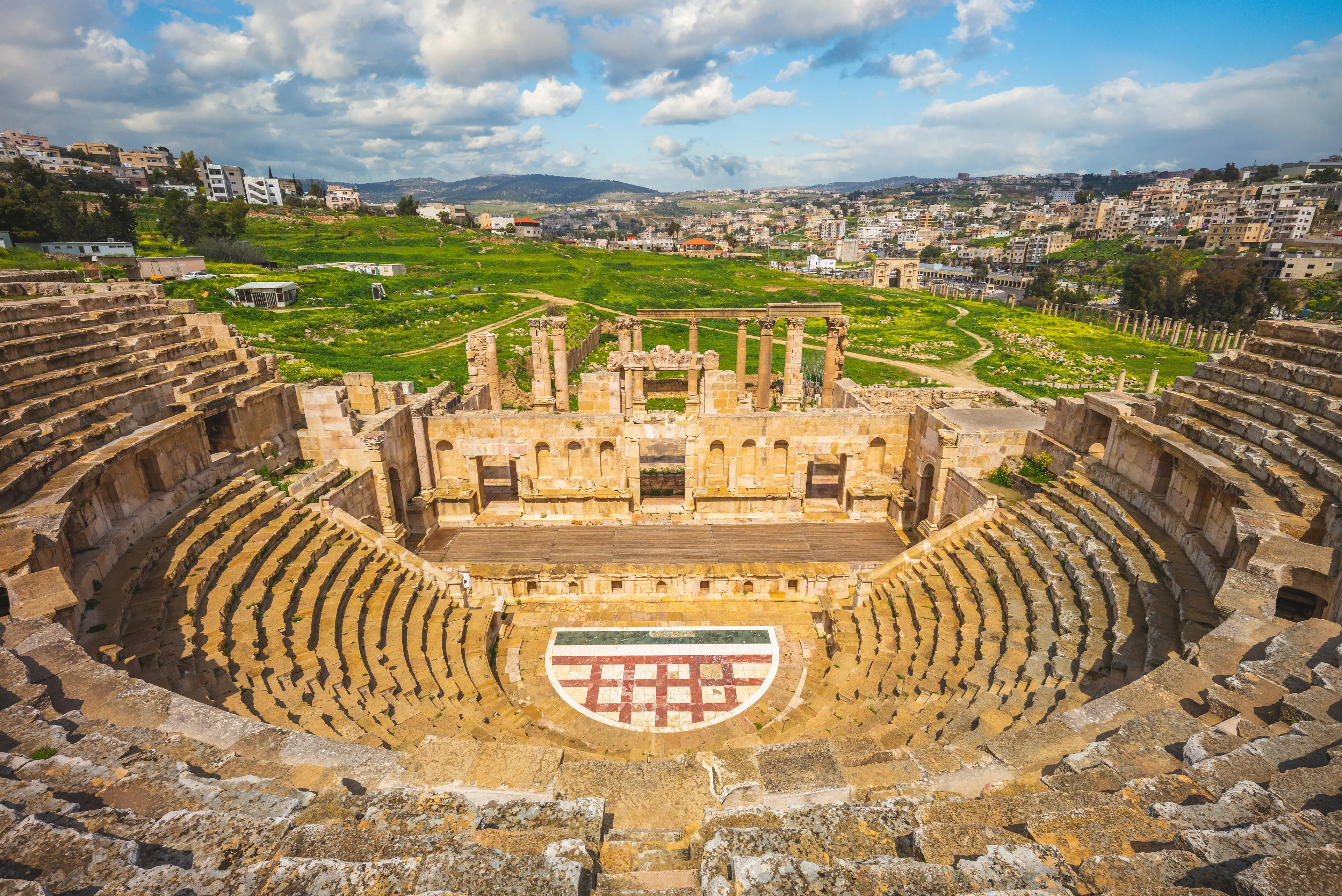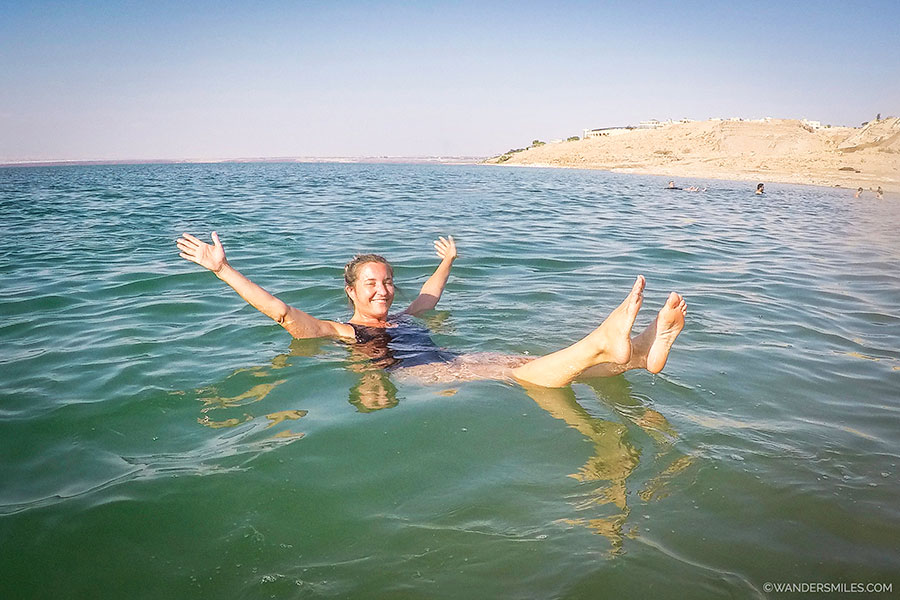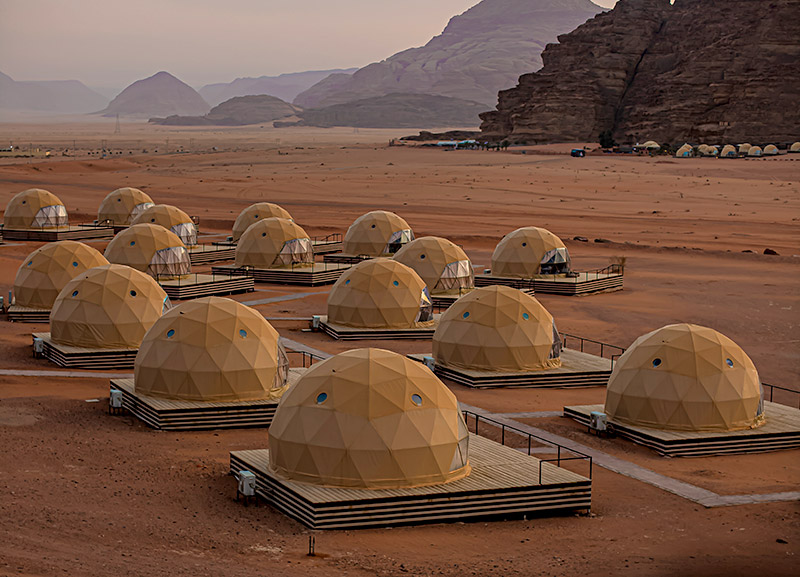Lost Cities and Local Flavours: The Best of Jordan on Your Tour from Israel

Discovering the Lost City of Petra
History and significance of Petra
As you step into the enchanting realm of Petra, a UNESCO World Heritage Site, you're not just visiting a remarkable archaeological wonder; you’re also walking through the pages of history. Founded in the 5th century BC by the Nabataeans, Petra was a thriving trading hub that linked various trade routes between the East and the West.
Its strategic location allowed it to flourish, making it the capital of the Nabataean Kingdom by the 1st century AD. The craftsmanship evident in its rock-cut architecture reflects the sophisticated engineering skills of its creators. Over time, Petra established itself as a centre of commerce, where exotic goods from spices to silk were exchanged.
- Key Historical Points:
- Nabataean Establishment: 5th century BC
- Trade Importance: Key stop for caravan routes
- UNESCO World Heritage Site: Designated in 1985
This once vibrant city, known as the "Rose City" for its stunning pink sandstone cliffs, fell into obscurity after the decline of the Roman Empire. What makes Petra truly significant is not just its archaeological splendour but also its representation of human ingenuity and adaptability in an unforgiving environment.
Exploring iconic landmarks such as Al-Khazneh (The Treasury)
One of the highlights of your Petra adventure will surely be Al-Khazneh, or The Treasury, a monumental façade that rises majestically out of the rock face. Its intricate carvings and Greco-Roman architectural influences will leave you in awe.
- Fun Facts about Al-Khazneh:
- Height: Approximately 40 metres
- Purpose: Believed to have been a royal tomb or a temple
- Name Origin: "Treasury" due to legends of hidden treasures
As you approach Al-Khazneh, the sheer scale of this structure is captivating. The narrow gorge, known as the Siq, leads you into an almost cinematic reveal of this iconic landscape. Don't forget to pause and take in the details; the ornate pillars, the grand statues, and even the lore surrounding its purpose create a tapestry that’s rich in culture and history.
Visiting Petra is more than just a journey to a lost city; it’s an immersion into the heart of an ancient world, where every stone has a story to tell.

Immerse in Local Jordanian Cuisine
Traditional dishes to try in Jordan
After exploring the ancient wonders of Petra, it's time to tantalise your taste buds with the rich flavours of Jordanian cuisine. This culinary journey reflects the country's nomadic heritage and agricultural bounty. Traditional dishes are not only a feast for the senses but also a reflection of Jordan’s hospitable culture.
When in Jordan, be sure to try:
- Mansaf: The national dish, featuring lamb cooked in a rich yoghurt sauce, served over rice, and traditionally garnished with almonds and pine nuts.
- Makloubeh: A delightful upside-down rice dish that’s layered with chicken, vegetables, and aromatic spices, creating a hearty meal perfect for sharing.
- Falafel: These deep-fried chickpea balls are crispy on the outside and soft inside, often served in pita bread with fresh vegetables and tahini sauce.
- Hummus: A staple throughout the region, this creamy chickpea dip is best enjoyed with pita bread, drizzled with olive oil and a sprinkle of paprika.
Each of these dishes tells a story of Jordan’s agricultural richness and cultural influences, so don't shy away from sampling!
Must-visit food markets and local eateries
To truly indulge in local flavours, visiting food markets and eateries is essential.
- Al-Balad Market in Amman: This bustling market offers an array of spices, fresh produce, and street food stalls. You can try local delicacies like shawarma while absorbing the vibrant atmosphere.
- Souk Jara: This open-air market, which comes alive during the summer months, showcases Jordan’s culinary diversity with many local vendors offering traditional sweets and snacks.
- Local Eateries: Don’t miss out on trying restaurants like Hashem Restaurant (known for its incredible falafel and hummus) or Sufra Restaurant, where you can savour authentic Jordanian dishes made with love.
Dining in Jordan isn't just about the food; it's a communal experience of sharing, warmth, and discovery that you will cherish forever as you connect with the local culture.

Unveiling the Ancient City of Jerash
Rich history and attractions in Jerash
As you continue your journey through Jordan's historic landscapes, the ancient city of Jerash beckons with its fascinating past and incredible ruins. Often referred to as the "Gerasa of Antiquity," Jerash is one of the best-preserved Greco-Roman cities in the world, showcasing a thrilling blend of history and culture that dates back over 2,000 years.
Founded by the Macedonians in the 4th century BC, Jerash flourished under Roman rule, becoming a key centre for commerce, art, and governance. The city was known for its grand architecture, street grid, and stunning temples, making it an essential stop on the ancient trade routes.
- Key Historical Highlights:
- Roman Influence: Many structures exhibit classical Roman design.
- Cultural Melting Pot: Home to various civilisations, each contributing to its rich tapestry.
- Active Archaeological Site: Ongoing excavations offer insights into Jerash’s layered history.
These historical dimensions make Jerash not just a destination but also a living timeline of human achievement.
Highlights of the archaeological site
When exploring Jerash, several landmarks should not be missed.
- The Oval Plaza: An impressive circular space lined with Corinthian columns, which serves as the heart of the city, surrounded by shops and theatres.
- Hadrian's Arch: This monumental gateway commemorates Emperor Hadrian's visit and stands as a significant feat of engineering.
- The Roman Theatre: Capable of seating 3,000 spectators, this remarkably preserved amphitheatre hosts performances that echo the past and offer a glimpse into the entertainment of ancient times.
- The South Theatre: Another highlight, featuring a beautifully restored acoustic system that showcases the impressive engineering of the Romans.
As you wander through the stunning ruins, adorned with intricate mosaics and grand staircases, you’ll feel the echoes of history come alive, tying you to a place that once thrived in the heart of the Roman Empire. Jerash is not merely to be seen; it’s an experience to be felt, a beautiful blend of the past that enriches your understanding of Jordan's heritage.

Delving into the Dead Sea Experience
Benefits and uniqueness of the Dead Sea
After immersing yourself in the archaeological wonders of Jerash, a visit to the iconic Dead Sea offers a perfect blend of relaxation and rejuvenation. Renowned for being the lowest point on Earth, this unique body of water is not only famous for its extreme salinity but also for its numerous health benefits.
The high concentration of minerals, such as magnesium, potassium, and calcium, found in the Dead Sea mud and water is believed to have therapeutic properties. Many visitors come seeking relief from various skin conditions, muscle aches, or even respiratory issues.
- Notable Benefits:
- Skin Health: The mineral-rich mud nourishes the skin, promoting softness and improving conditions like psoriasis.
- Stress Relief: Floating in the dense water can help ease tension and provide a sense of tranquillity.
- Detoxification: Soaking in the Dead Sea helps eliminate impurities from the body, giving you a refreshing feeling.
It's a place where science and nature converge, offering experiences that are hard to replicate anywhere else.
Relaxation and wellness activities at the Dead Sea
At the Dead Sea, relaxation comes effortlessly. You can indulge in a variety of wellness activities designed to enhance your overall well-being:
- Mud Baths: Cover yourself in the famed black mud, let it dry in the sun, and then rinse off in the mineral-rich waters.
- Spa Treatments: Many resorts offer luxurious spa services, including massages, facials, and body scrubs that incorporate local minerals.
- Floating Experience: Swimming is nearly impossible due to the salt concentration, but effortlessly floating is a must-try activity—it’s like being suspended in water with no effort at all!
- Sunset Yoga: For those seeking mindfulness, participating in a sunset yoga session overlooking the serene landscape is an incredibly calming experience.
These wellness activities allow you to unwind and reconnect with your inner self, making the Dead Sea not just a natural wonder but also a sanctuary of health and relaxation. Whether you come for the unique physical properties or simply to float in bliss, your time at the Dead Sea will undoubtedly refresh both body and spirit.

The Vibrant Culture of Amman
Overview of Amman's cultural scene
Having soaked up the serenity of the Dead Sea, it's time to dive into the vibrant culture of Jordan’s capital, Amman. This bustling metropolis is a stunning fusion of the ancient and the modern, offering a rich tapestry of experiences that reflect Jordan's diverse heritage.
Amman's cultural scene is a lively mosaic of art, music, and gastronomy. The city's cultural heartbeat can be felt in its lively markets, contemporary art galleries, and open-air festivals that celebrate Jordanian traditions. Local artisans showcase their crafts, from pottery to textiles, often at street stalls or in quaint boutiques.
- Cultural Highlights:
- Art Galleries: Explore the Jordan National Gallery of Fine Arts, which features works from local and international artists.
- Live Music: Enjoy performances at venues like Al Balad Theatre, where traditional music and contemporary sounds beautifully collide.
- Theatre and Dance: The city frequently hosts cultural events, including theatrical plays and folklore performances.
These experiences not only immerse you in the Jordanian way of life but also foster connections with the local community.
Visiting historical sites and modern attractions in the capital
As you explore, don’t miss the juxtaposition of Amman's historical sites and modern attractions.
- The Citadel: A must-visit, this ancient hilltop site offers stunning views and houses remnants from the Roman, Byzantine, and Umayyad eras, including the Temple of Hercules and the Umayyad Palace.
- Roman Theatre: This historical gem, built in the 2nd century AD, hosts various cultural events and performances, allowing you to experience its grandeur firsthand.
On the flip side, Amman’s modern side shines brightly as well.
- Rainbow Street: Famous for its trendy cafes, restaurants, and shops, it’s a fantastic place to relax and soak up energy.
- King Abdullah I Mosque: A beautiful blend of modern architecture and traditional Islamic elements, this mosque is open to visitors and provides a peaceful space for reflection.
In Amman, you will find a capital that beautifully embraces its past while seamlessly welcoming the future. The vibrancy of its culture enriches every visit, making it an unforgettable part of your Jordanian journey.

Bedouin Hospitality in Wadi Rum
Bedouin lifestyle and traditions
As you leave the bustling atmosphere of Amman behind, a journey into the magnificent landscapes of Wadi Rum unveils the traditional Bedouin way of life. This vast desert, with its striking red sand and towering sandstone mountains, is home to the Bedouin people, whose rich history and deep connection to the land offer a unique glimpse into their lifestyle and traditions.
The Bedouin are renowned for their hospitality, a cornerstone of their culture. Visitors often find themselves welcomed with open arms, experiencing a warm and genuine reception that makes every stay memorable.
- Cultural Highlights of Bedouin Life:
- Traditional Hospitality: Bedouins often greet guests with a cup of tea or coffee, symbolising respect and friendship.
- Nomadic Heritage: Historically, they have been nomads, relying on their deep knowledge of the desert for survival, which is reflected in their unique crafts and storytelling traditions.
- Community Values: Family and community hold immense significance, with many traditions revolving around sharing and cooperation.
By immersing yourself in this culture, you gain insight into a way of life that has survived and thrived in one of the world’s most challenging environments.
Camping under the stars in the Wadi Rum desert
Camping under the expansive starry sky of Wadi Rum is an experience like no other. After a day of exploring the breathtaking landscapes—such as the iconic rock formations and ancient petroglyphs—settling down for the night in a Bedouin camp is the perfect way to connect with nature.
- Experience Highlights:
- Tents: Traditional Bedouin tents made from goat hair provide shelter while allowing you to remain enveloped in the desert's charm.
- Night Sky: With minimal light pollution, the stars twinkle with unparalleled brilliance, often leaving visitors in awe. It's the perfect backdrop for storytelling or simply reflecting on the beauty of the universe.
- Bedouin Barbecue: Enjoy a delicious feast featuring traditional dishes cooked over an open fire, often complemented by warm conversation with your hosts.
Camping in Wadi Rum is not just an overnight stay; it’s a way to unwind, rejuvenate, and embrace the timeless practices of a culture that treasures connection, both with the land and its people. This unique experience will undoubtedly leave you with cherished memories and a greater appreciation for the beauty of Jordanian hospitality.
Practical Tips for Travelling in Jordan
Visa requirements and entry regulations
As you prepare for your adventure in Jordan, understanding the visa requirements and entry regulations is essential for a smooth journey. While many nationalities can obtain a visa on arrival, it's always a good idea to double-check the latest regulations before your trip. Here’s a quick guide:
- Visa on Arrival: Citizens from several countries, including the EU, USA, Canada, and Australia, can usually obtain a visa upon entry for a duration of 30 days.
- Jordan Pass: If you plan to visit multiple attractions, consider getting the Jordan Pass, which includes visa fees and access to many historical sites, including Petra and Jerash.
- Entry Points: The most popular entry points are Queen Alia International Airport in Amman, the Allenby Bridge from Israel, and the Wadi Araba border crossing from Egypt.
Before flying, ensure your passport is valid for at least six months beyond your intended stay to avoid any issues at customs.
Safety precautions and cultural etiquette
Jordan is known for its warm hospitality and safety, making it a favourable destination for travellers. However, taking some safety precautions and understanding cultural etiquette will enhance your experience.
- Dress Modestly: Especially in rural areas and when visiting religious sites, wearing conservative attire is respectful and appreciated.
- Be Mindful of Social Norms: Avoid public displays of affection, as these may be frowned upon. Respect local customs and traditions to make a good impression.
- Stay Hydrated: The desert climate can be hot and arid, so drink plenty of water, and always carry a bottle, especially when exploring places like Petra or Wadi Rum.
Engaging with locals is a highlight of any trip. When you do, use simple pleasantries such as "Marhaba" (Hello) or "Shukran" (Thank you) to show respect for their language and culture.
With these practical tips in mind, you’ll be well-equipped for your journey through Jordan's enchanting landscapes and rich heritage. Embrace the experience and enjoy all that this remarkable country has to offer!
Conclusion: Bringing the Best of Jordan Back Home
Souvenirs and memories to cherish from your Jordan tour
As your remarkable journey through Jordan comes to an end, it’s time to reflect on all the incredible experiences you've had and think about the perfect souvenirs to take home. These tokens will help capture the essence of your time in this ancient land, ensuring that the memories stay alive long after you’ve left.
When shopping in local markets, consider picking up:
- Handmade Pottery: Unique pieces showcasing traditional designs, often both functional and beautiful.
- Textiles: Scarves, rugs, or keffiyehs (traditional Arab headdresses) make practical yet meaningful mementoes.
- Dead Sea Products: Items such as bath salts, mud masks, or skincare products boast therapeutic properties and can remind you of your rejuvenating experience at the Dead Sea.
- Spices: A selection of fragrant spices will bring the tastes of Jordanian cuisine to your kitchen, from za'atar to sumac.
Each of these items carries a story of Jordan’s rich heritage, serving as a personal reminder of your journey.
The lasting impact of experiencing Jordan's lost cities and local flavours
The impact of experiencing Jordan's lost cities and local flavours goes beyond simply seeing stunning sights or tasting delicious food. It's about immersing yourself in a culture that has thrived for millennia, connecting with the warmth of the people, and understanding the depth of their traditions.
As you recall the breathtaking views of Petra’s rock-cut structures, the soothing landscape of the Dead Sea, and the vibrant energy of Amman, you’ll find that these memories shape how you perceive the world.
- Cultural Enlightenment: Your understanding of Jordan's intricate history and cultural tapestry may inspire a newfound appreciation for the art of storytelling.
- Culinary Curiosity: The flavours of Jordan may spark your curiosity to explore Middle Eastern cuisine further or even recreate the dishes at home for friends and family.
- Adventure Motivation: This journey might ignite a passion for travel to explore more hidden gems globally.
In essence, your Jordanian adventure not only enriches your life with unforgettable memories but also leaves an enduring impact that continues to inspire discovery and connection wherever you go.
